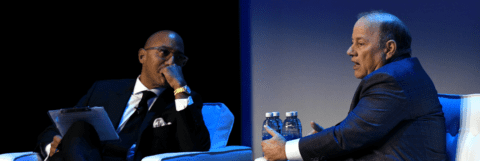In his ninth year as mayor of Detroit, Mike Duggan took the main stage at the 2023 Detroit Policy Conference for an interview with Dennis W. Archer Jr., Chairman and Chief Executive Officer of sixteen42 ventures.
During the interview, Duggan spoke about various topics, ranging from entrepreneurship, neighborhood development, and the wealth gap in Detroit. Here are some of the interview’s key takeaways.
On Entrepreneurship in Detroit
Entrepreneurs in Detroit seeking financial and other support services have access to various initiatives that help small businesses throughout the city. During Duggan’s interview, he shared MotorCity Match and Invest Detroit as two initiatives that provide growth opportunities to new and established entrepreneurs.
“It has been exciting to watch these entrepreneurs get successful, open a second site, open a third site, and in some cases, find their way into Midtown and downtown,” said Duggan. “I go to every single new business opening. To listen to someone’s story…there’s nothing more enjoyable about this job.”
On Detroit Neighborhood Development
Although downtown and Midtown are two of the most talked-about areas for development in Detroit, one would be remiss to think they’re the only available locations, according to Duggan. The city consists of more than “downtown, Midtown, and the neighborhoods,” – something he shared many people make the mistake of lumping into one.
“There [are] opportunities in Jefferson Chalmers, on Livernois, on Grand River, on McNichols,” said Duggan. “If you look at what’s happening today on Livernois, where you can’t get a parking space on a Friday night; you look at McNichols where we put in a streetscape and now the plywood has been pulled off almost every one of those vacant storefronts and buildings; and if you haven’t seen what’s happening on East Warren, which we completed this year.
“It is exciting to be doing Dexter, West Warren, Rosa Parks, Kercheval…We are seeing vibrant commercial districts; we are seeing vacant apartment buildings renovated; and it’s exciting to have opportunities not just in this area, but of course I never thought I’d see the kind of development we’re seeing downtown.”
On Intentionality and the Wealth Gap
“Intentionality” was a popular word during the 2023 Conference, having been used during many other sessions discussing the future of downtown Detroit. Duggan’s idea of intentionality is placemaking, which was “where you actually plan out where you’re going to work and live and what the environment’s going to be like” and used Campus Martius as an example.
Other examples he shared were the two affordable housing apartment buildings on Washington Boulevard that housed 165 seniors. When the lease was over, Duggan said the buildings’ owner could earn more profit by kicking the tenants out, renovating the apartments, and leasing the units at market rate. However, the city and the owner made a deal to extend leases and renovate the subsidized units, keeping all 165 seniors at home.
Moving forward, Duggan said he wants to continue being intentional in keeping people in their homes and ensuring new affordable housing units are built in the city, like Steven Ross’ current development of 650 apartment units, with 20% being subsidized. Building more affordable housing—versus just renovating existing developments—reduces the chances of areas becoming economically segregated, according to Duggan.
“Detroit is a place where the doctor who works in Henry Ford Hospital should be able to be in the same neighborhood as the Henry Ford hospital workers working in the cafeteria and pushing the wheelchairs,” Duggan said. “That’s what a city is about: people of different incomes and different backgrounds living together…we are building a city where people of all incomes are welcome in all neighborhoods.”
Another example of intentionality by the city came from Archer, who shared his experiences of building a team of all African Americans and bidding on two Harmony Park buildings that the city put out a request for proposal for. To this day, those buildings are still 100% African American-owned, according to Archer, with six African American tenants.
“That is because of intentionality,” said Archer.
Thank you to MotorCity Casino Hotel for sponsoring this session.

